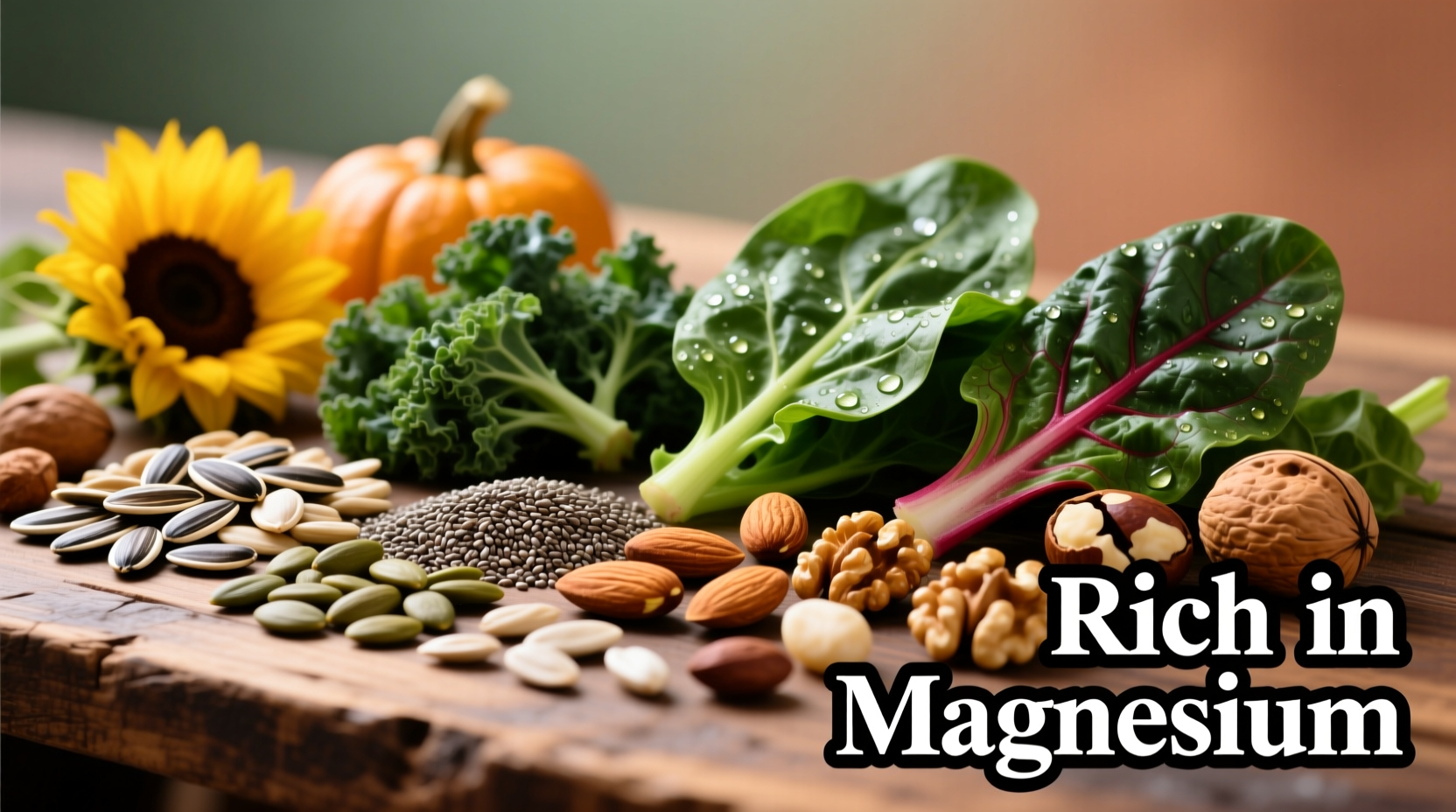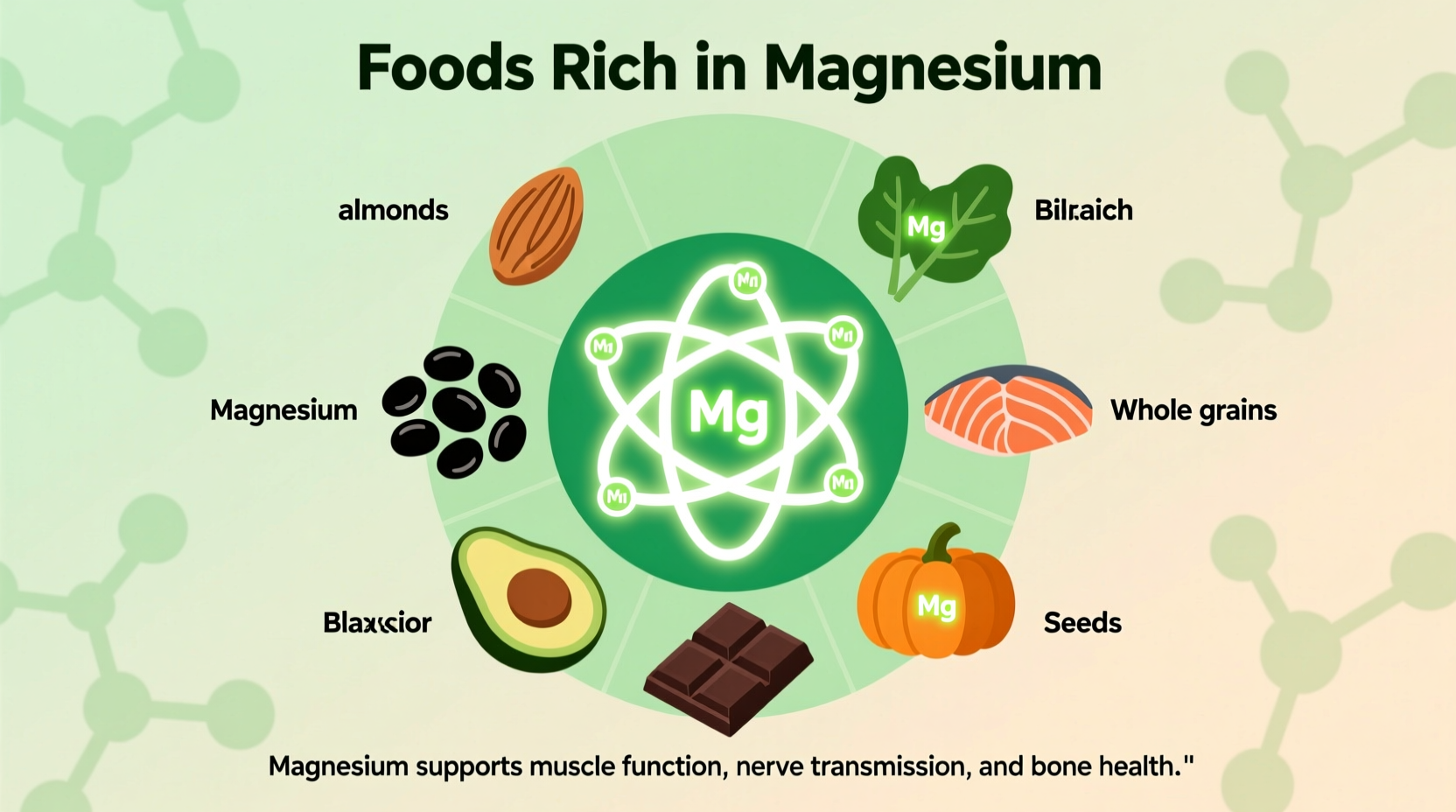If you're searching for what food has magnesium in it, you're likely looking to boost this essential mineral through diet. Magnesium plays a critical role in over 300 biochemical reactions in your body, from nerve function to blood sugar regulation. Yet nearly half of Americans don't get enough magnesium from their diet alone, according to the National Institutes of Health.
Why Magnesium Matters for Your Health
Magnesium deficiency often flies under the radar with symptoms like muscle cramps, fatigue, and irregular heartbeat. The recommended daily allowance (RDA) is 400-420mg for men and 310-320mg for women. Athletes, older adults, and those with digestive conditions may require more due to increased needs or reduced absorption.

Top Magnesium-Rich Foods by Category
Understanding what food has magnesium in it requires looking beyond single "superfoods" to build balanced dietary patterns. Here's how common foods stack up:
| Food | Serving Size | Magnesium (mg) | % Daily Value |
|---|---|---|---|
| Pumpkin seeds | 1 ounce (28g) | 156 | 37% |
| Spinach (cooked) | 1 cup (180g) | 157 | 37% |
| Almonds | 1 ounce (28g) | 80 | 19% |
| Black beans | 1 cup (172g) | 120 | 29% |
| Avocado | 1 medium (200g) | 58 | 14% |
| Dark chocolate (70-85%) | 1 ounce (28g) | 64 | 15% |
Data sourced from the USDA FoodData Central database, the most comprehensive nutritional reference available to consumers.
Maximizing Magnesium Absorption: Practical Strategies
Knowing what food has magnesium in it is only half the equation. Your body absorbs magnesium differently depending on preparation methods and food combinations:
- Soak nuts and seeds overnight to reduce phytic acid, which can inhibit magnesium absorption
- Pair with vitamin D-rich foods like fatty fish to enhance mineral uptake
- Avoid excessive zinc supplements (above 142mg daily) which can interfere with magnesium absorption
- Cook spinach rather than eating raw—cooking breaks down oxalic acid that binds magnesium
Special Considerations for Different Lifestyles
While exploring what food has magnesium in it, consider these context-specific factors:
Athletes: Endurance exercise increases magnesium loss through sweat. A study published in the Journal of the International Society of Sports Nutrition found athletes often require 10-20% more magnesium than sedentary individuals.
Older Adults: Magnesium absorption decreases with age. The Mayo Clinic recommends older adults prioritize magnesium-rich foods over supplements when possible due to better absorption and safety.
Vegans and Vegetarians: Plant-based diets naturally contain more magnesium, but also more phytates. Soaking, sprouting, and fermenting grains and legumes can increase bioavailability by up to 50%, according to research from the American Journal of Clinical Nutrition.
Simple Ways to Add Magnesium-Rich Foods to Your Daily Routine
You don't need complicated recipes to incorporate more magnesium. Try these practical solutions:
- Breakfast boost: Add 2 tablespoons of pumpkin seeds to your morning oatmeal (100mg magnesium)
- Lunch upgrade: Swap lettuce for spinach in sandwiches (78mg per 2 cups raw)
- Smart snack: Keep a small container of almonds at work (80mg per ounce)
- Dinner enhancement: Include black beans in soups and salads (120mg per cup)
These small changes can add 200-300mg of magnesium to your daily intake without requiring major dietary overhauls.
When Food Isn't Enough: Recognizing Limitations
While focusing on what food has magnesium in it should be your first approach, certain medical conditions may require supplementation. Gastrointestinal disorders like Crohn's disease, chronic alcoholism, and type 2 diabetes can significantly impair magnesium absorption. Always consult with a healthcare provider before starting supplements, as excessive magnesium from supplements (not food) can cause digestive issues.











 浙公网安备
33010002000092号
浙公网安备
33010002000092号 浙B2-20120091-4
浙B2-20120091-4